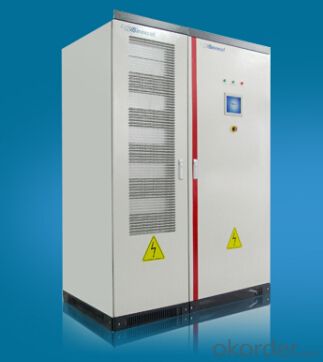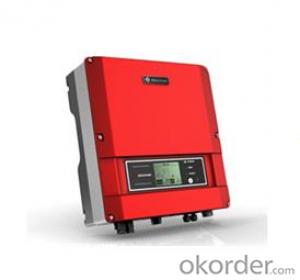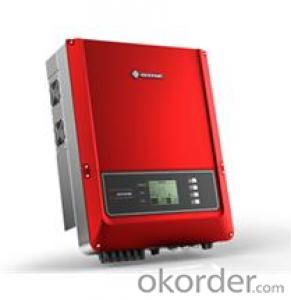Exide Solar PV Inverter
- Loading Port:
- Shekou
- Payment Terms:
- TT OR LC
- Min Order Qty:
- -
- Supply Capability:
- 1000 unit/month
OKorder Service Pledge
OKorder Financial Service
You Might Also Like
● DC/DC,DC/AC two transform to achieve ultra-wide range input.
● Highly efficient and stable components from internationally recognised brands.
● Two independent MPPT input,respectively,using advanced MPPT control technology to achieve high MPPT tracking efficiency.
● Advanced three-level technology.
● Output voltage 400VAC,with a standard voltage direct match to reduce cost of power plant construction.
● Accurate power control, active and reactive power can be achieved independent scheduling and excellent start and stop control.
● Advanced system thermal solution and energy efficiency management,low temperature rise;thin-film capacitor design,long lifespan.
● According to State Grid and requirements of German BDEW low-voltage ride through.
● LCD display,multi-language setting,multi-communication interface.
● Programmable protective and running parameters.
● Modular design, easy to install,operate and maintain.
● Wide temperature range design, suitable for harsh environment.
- Q: What is the role of a solar inverter in maximizing solar panel output?
- The role of a solar inverter in maximizing solar panel output is to convert the direct current (DC) generated by the solar panels into alternating current (AC) which can be used to power electrical devices in homes or businesses. The inverter ensures that the AC output is synchronized with the grid's frequency and voltage, allowing for efficient and effective utilization of solar energy. Additionally, the inverter also helps in monitoring and optimizing the performance of the solar panels, ensuring that they operate at their maximum efficiency and produce the highest possible output.
- Q: Can a solar inverter be used with different types of grounding configurations?
- Yes, a solar inverter can be used with different types of grounding configurations. However, it is important to ensure that the inverter is compatible with the specific grounding configuration being used in order to maintain safety and performance.
- Q: Can a solar inverter be used in systems with different module efficiencies?
- Yes, a solar inverter can be used in systems with different module efficiencies. The solar inverter is designed to convert the DC electricity produced by the solar modules into AC electricity that can be used in the electrical grid or to power appliances. It does not depend on the module efficiency, but rather on the DC voltage and current produced by the modules. Therefore, as long as the DC output of the modules falls within the specifications of the solar inverter, it can be used regardless of the module efficiencies.
- Q: Can a solar inverter be used with different grid voltages or frequencies?
- No, a solar inverter cannot be used with different grid voltages or frequencies. Solar inverters are designed to convert the DC power generated by solar panels into AC power that matches the specific voltage and frequency of the local electrical grid. Using a solar inverter with different grid voltages or frequencies can lead to compatibility issues and may result in inefficient or malfunctioning operation of the system.
- Q: How do you calculate the payback period for a solar inverter?
- To calculate the payback period for a solar inverter, you need to determine the initial cost of the inverter and the annual savings or earnings it generates. Divide the initial cost by the annual savings or earnings to determine the number of years it will take to recoup the investment. This will give you the payback period for the solar inverter.
- Q: What is the role of voltage regulation in a solar inverter?
- The role of voltage regulation in a solar inverter is to ensure that the voltage output from the solar panels is converted and maintained at a stable and appropriate level for efficient and safe operation of electrical devices or for grid connection. This regulation helps to optimize the performance of the solar inverter and prevents voltage fluctuations that could potentially damage or disrupt the functioning of connected equipment.
- Q: What is the efficiency rating of a solar inverter?
- The efficiency rating of a solar inverter refers to the percentage of solar energy that is converted into usable electricity. It is a measure of how effectively the inverter can convert the direct current (DC) output from the solar panels into alternating current (AC) electricity that can be used to power household appliances or be fed back into the grid. The higher the efficiency rating, the more efficient the inverter is at converting solar energy into electricity.
- Q: Can a solar inverter be used in areas with high seismic activity?
- Yes, a solar inverter can be used in areas with high seismic activity. However, it is important to ensure that the solar inverter is designed to withstand and operate safely under such conditions. Solar inverters are typically built with robust and durable materials to be able to withstand various environmental factors, including seismic activity. They are often tested and certified to meet specific standards for seismic resistance. When installing a solar inverter in an area with high seismic activity, it is crucial to follow the manufacturer's guidelines and recommendations. This may involve using additional measures such as reinforced mounting structures, flexible connections, and proper grounding techniques to enhance the stability and resilience of the inverter system. Moreover, regular maintenance and inspections should be conducted to ensure that the solar inverter remains in good working condition even after seismic events. This includes checking for any signs of damage, loose connections, or other potential issues that may have been caused by seismic activity. By taking appropriate precautions and using seismic-resistant solar inverters, it is possible to safely and effectively harness solar energy even in areas prone to seismic activity.
- Q: What is the maximum power capacity of a solar inverter?
- The maximum power capacity of a solar inverter can vary depending on the model and specifications, but it is generally in the range of a few kilowatts to several megawatts.
- Q: Can a solar inverter be used with a solar-powered heating system?
- Yes, a solar inverter can be used with a solar-powered heating system. A solar inverter converts the DC power generated by solar panels into AC power that can be used for various applications, including heating systems. By connecting the solar inverter to the solar panels and the heating system, the generated solar power can be efficiently utilized to provide heat for the system.
Send your message to us
Exide Solar PV Inverter
- Loading Port:
- Shekou
- Payment Terms:
- TT OR LC
- Min Order Qty:
- -
- Supply Capability:
- 1000 unit/month
OKorder Service Pledge
OKorder Financial Service
Similar products
Hot products
Hot Searches
Related keywords



















